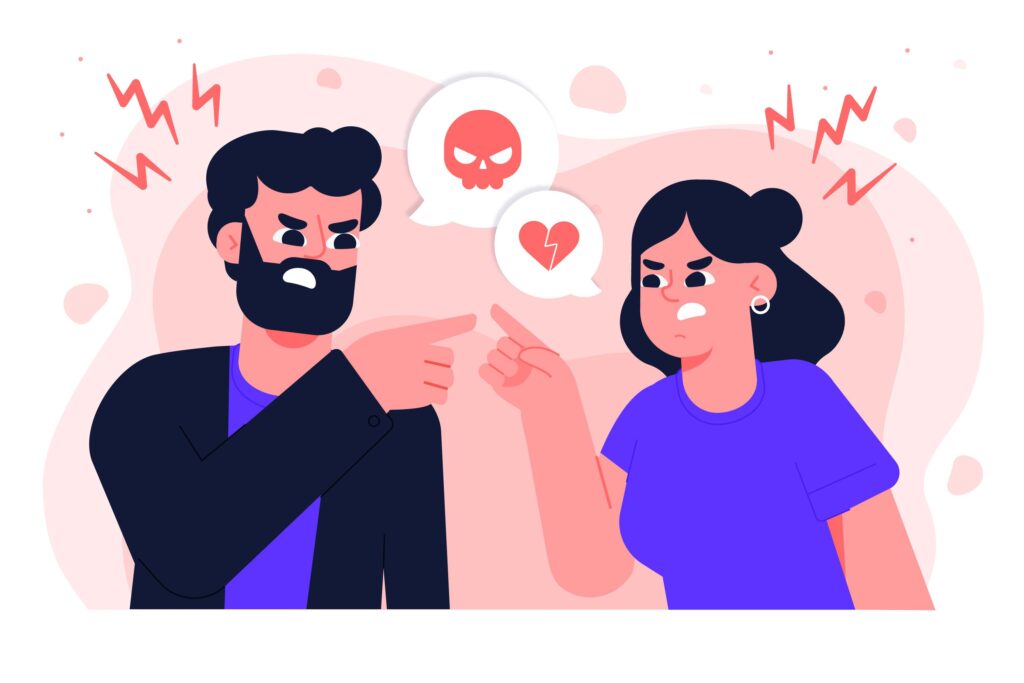In today’s world, it’s more common than ever to find yourself in a toxic relationship. Whether it’s with a partner, a friend, or a family member, toxic relationships can cause immense harm and leave lasting scars. It’s important to know how to recognize the signs of a toxic relationship and how to take steps to protect yourself.
What Is a Toxic Relationship?

A toxic relationship is a relationship characterized by behaviors on the part of the toxic partner that are emotionally and, sometimes, physically damaging to their partner. This can include jealousy, control, manipulation, and verbal or physical abuse. A toxic relationship can also involve neglect or indifference, where the toxic partner shows a lack of concern for the well-being of their partner.
Signs of a Toxic Relationship
There are many signs that you may be in a toxic relationship, but some of the most common include:
- Constant criticism and blame
- Controlling behavior, such as monitoring your actions or controlling your finances
- Physical, verbal, or emotional abuse
- Jealousy and possessiveness
- Neglect or indifference
- Gaslighting, where your partner manipulates or denies reality to make you doubt your own perceptions
If you’re experiencing any of these behaviors, it’s important to take action to protect yourself.
How to Protect Yourself from a Toxic Relationship
If you find yourself in a toxic relationship, it is crucial to prioritize your safety and well-being. To protect yourself, you can seek support from friends and family, seek professional help through therapy or counseling, document instances of abuse (physical, verbal, or controlling behavior), create a plan to exit the relationship, and even consider obtaining a restraining order if necessary. The goal is to remove yourself from an unhealthy situation and to get the support you need to heal and move forward.
How to Get Out of a Toxic Relationship
Getting out of a toxic relationship can be difficult, but it’s important to take the steps necessary to protect yourself. Here are some tips for ending a toxic relationship:
- Be clear and direct with your partner about your decision to end the relationship
- Cut off contact, if possible
- Surround yourself with supportive friends and family
- Seek professional help, such as therapy or counseling, to work through the emotional toll of the relationship
- Get a restraining order, if necessary
Moving Forward After a Toxic Relationship
In a relationship, it’s important to pay attention to the signs that it may be unhealthy or toxic. An unhealthy relationship can lead to unhappiness, stress, and even abuse, while a toxic relationship can be even more damaging to your mental and emotional well-being. Some of the common signs of an unhealthy relationship include lack of communication, controlling behavior, physical, emotional, or verbal abuse, jealousy and possessiveness, and lack of respect. On the other hand, some of the signs of a toxic relationship include control, emotional abuse, verbal abuse, physical abuse, stalking, isolation, threats, jealousy, blaming, and infidelity. In addition to these signs, a red flag in a relationship is if your partner regularly disrespects your feelings, thoughts, or desires. It’s important to recognize these warning signs and take steps to protect yourself and your well-being.
Five Signs of an Unhealthy Relationship
- Lack of Communication: When there is a lack of communication in a relationship, it can lead to misunderstandings, misinterpretations, and even a breakdown in trust.
- Controlling Behavior: If one person in the relationship tries to control or manipulate the other person, it is a sign of an unhealthy relationship. This can range from controlling what the other person wears, to whom they see, or even what they think.
- Physical, Emotional, or Verbal Abuse: Any form of physical, emotional, or verbal abuse is a clear sign of an unhealthy relationship. This includes physical violence, emotional manipulation, and verbal insults.
- Jealousy and Possessiveness: Jealousy and possessiveness can lead to controlling behavior, and can also be a sign of low self-esteem. If one person in the relationship is constantly questioning the other person about their activities or trying to control their time and attention, it is a sign of an unhealthy relationship.
- Lack of Respect: When one person in the relationship doesn’t respect the other person’s feelings, thoughts, or desires, it is a sign of an unhealthy relationship. This can lead to the other person feeling unheard, unvalued, and even abused.
Ten Signs of a Toxic Relationship

- Control: A toxic partner may try to control or manipulate you by telling you what to do, who to see, or what to think.
- Emotional Abuse: A toxic partner may use emotional abuse tactics such as gaslighting, manipulation, or belittling you to make you feel inferior or to control you.
- Verbal Abuse: A toxic partner may use verbal abuse, including yelling, name-calling, or insults to put you down or control you.
- Physical Abuse: A toxic partner may use physical violence, such as hitting, pushing, or restraining you, to control or manipulate you.
- Stalking: A toxic partner may stalk you, including showing up unannounced, monitoring your movements, or checking up on you excessively.
- Isolation: A toxic partner may try to isolate you from your friends, family, or other support systems, to control you and limit your options.
- Threats: A toxic partner may use threats, including threats of violence, threats to harm themselves, or threats to harm others, to control or manipulate you.
- Jealousy: A toxic partner may exhibit excessive jealousy or possessiveness, leading to controlling behavior or even abuse.
- Blaming: A toxic partner may constantly blame you for problems in the relationship, or blame outside circumstances or other people for their own behavior.
- Infidelity: A toxic partner may engage in infidelity, including cheating on you or betraying your trust in other ways.
Red Flags in a Relationship
- Disrespect: If your partner regularly disrespects your feelings, thoughts, or desires, it is a red flag in the relationship. Inadequate Boundaries: If your partner invades your privacy, disregards your boundaries, or refuses to respect your boundaries, it’s a red flag in the relationship.
- Inconsistent Communication: If your partner frequently changes their behavior, expectations, or plans without adequate communication, it is a red flag in the relationship.
- Lack of Emotional Support: If your partner fails to provide emotional support, empathy, or understanding, it is a red flag in the relationship.
- Intolerance of Differences: If your partner is unable to accept or tolerate your differences, it is a red flag in the relationship.
- Inability to Apologize: If your partner is unable or unwilling to apologize or take responsibility for their actions, it is a red flag in the relationship.
- How to Know if Someone is Not Good for You Inconsistent Actions: If someone’s actions are inconsistent with their words, it may indicate that they are not good for you.
- Lack of Emotional Support: If someone fails to provide emotional support, empathy, or understanding, it may indicate that they are not good for you.
- Disrespect: If someone regularly disrespects your feelings, thoughts, or desires, it may indicate that they are not good for you.
- Inadequate Boundaries: If someone invades your privacy, disregards your boundaries, or refuses to respect your boundaries, it may indicate that they are not good for you.
- Toxic Behavior: If someone engages in toxic behavior such as jealousy, control, abuse, or infidelity, it may indicate that they are not good for you.
Conclusion
Toxic relationships can cause immense harm, both emotionally and physically. It’s important to know the signs of a toxic relationship and to take steps to protect yourself and to get out of the relationship as soon as possible. If you’re experiencing any of the behaviors described above, it’s important to seek support from friends and family, as well as professional help. Remember, healing and moving forward after a toxic relationship takes time and effort, but with the right support, it is possible to regain a sense of self and to build a happy and healthy life.


